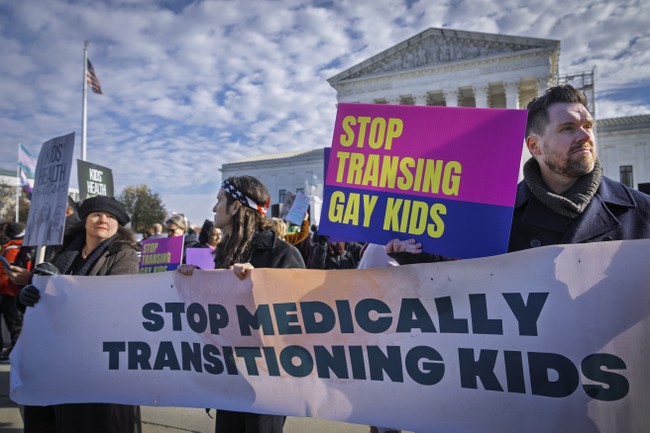We support our Publishers and Content Creators. You can view this story on their website by CLICKING HERE.

Dr. Johanna Olson-Kennedy runs the gender clinic at Children’s Hospital in Los Angeles. You can read an interview with her about trans health here on the Children’s Hospital website. As author Jesse Singal explains in a report for the Economist, Dr. Olson-Kennedy isn’t just any doctor, she’s one of the most outspoken proponents of gender affirming care for minors in the country, i.e. someone who is quoted in the media on this topic frequently.
Advertisement
Her activism seems to have overcome her commitment to transparency. Recently, Dr. Olson-Kennedy made news for sitting on the results of a government funded study of trans children because the outcome didn’t support her ideological commitments. The study, which she launched in 2015, was supposed to demonstrate that children given puberty blockers were better off, i.e. less prone to harm themselves and happier. But the data didn’t show that. In fact it seems to show no real improvement from her treatment. Rather than publish the result, she decided to quietly sit on her findings. She told the NY Times, “I do not want our work to be weaponized.”
Some doctors in the field have emphasized the need for a thorough psychological assessment of young patients, Dr. Olson-Kennedy has gone in the other direction.
Dr Olson-Kennedy has emerged as a critic of what she views as undue and unnecessary “gatekeeping”. “I don’t send someone to a therapist when I’m going to start them on insulin,” she told the Atlantic in 2018.
But as of yesterday, Dr. Olson-Kennedy is being sued by a former patient named Clementine Breen.
Ms Breen’s story starts early in the 2016-17 school year, when she turned 12. She felt depressed and sought help from a guidance counsellor. “I mentioned that I might be trans,” she recalled in the interview, “but I also mentioned that I might be a lesbian and that I might be bisexual, like I wasn’t really sure about my identity at all.” In retrospect, she said, she believes that her unsettled feelings about going through puberty stemmed from a violent situation at home involving her older brother, who has severe autism, as well as sexual abuse she experienced at the hands of someone outside the family when she was six years old, which she did not disclose to anyone until much later.
Ms Breen and her lawyers claim that despite the vagueness of her musings about her identity, her counsellor fixed on the possibility that she was transgender. “Based on those conversations and few statements, the counsellor called Clementine’s parents and told them she believed Clementine was transgender,” they write in the complaint. With the support of her school, Ms Breen, who went by the name Kaya at the time, changed her name to Kai and her pronouns to he/him. Her parents took her to the CHLA gender clinic, and Ms Breen’s first appointment there, records show, was in December 2016.
Dr Olson-Kennedy’s notes from that first visit show that she immediately set Ms Breen down a path towards medical transition. She writes that Ms Breen had not yet seen a gender therapist and had come out as trans three months earlier. Nevertheless, she asserts that Ms Breen meets the specific Diagnostic and Statistical Manual criteria for gender dysphoria, one of which, she writes, is a cross-sex identity that has lasted for six months or longer. A bit later Dr Olson-Kennedy asserts that Ms Breen also meets the criteria for the commencement of puberty blockers, including not “suffer[ing] from psychiatric comorbidity that interferes with the diagnostic work-up or treatment”. It is unclear how Dr Olson-Kennedy could have known that given that Ms Breen had not yet seen a psychologist about her gender dysphoria, and given that Dr Olson-Kennedy herself had performed no mental-health evaluation.
Advertisement
Three months later she was put on puberty blockers and within a year Dr. Olson-Kennedy had prescribed her testosterone. At this point her parents became concerned. Breen’s legal complaint claims that Dr. Olson-Kennedy pulled them aside and warned that their 13-year-old daughter was suicidal and that if she didn’t get the hormone therapy she would kill herself. Breen claims that, at this point, she had never expressed any intent to kill herself to anyone including Dr. Olson-Kennedy. In any case, the parents backed down and Breen was put on testosterone.
A year later at age 14, she had a double mastectomy. Dr. Olson-Kennedy wrote a letter to the surgeon claiming that Breen had identified as trans “since childhood.” That’s a bit vague but it implies she was someone who’d felt this way for many years. But as Dr. Olson-Kennedy’s own notes demonstrate, Breen had only adopted a trans identity about 3 months before their first meeting.
Ultimately, gender affirming care and testosterone didn’t make Breen happy. She began cutting herself and started missing most of her testosterone shots. Finally she went to a different therapist (different than the one recommended by Dr. Olson-Kennedy) and started talking about the sexual abuse she’d experienced as a child. Now age 20, she believes she would never have gone down this path at all if she’d had a proper therapist at age 12.
The significance of the lawsuit is two-fold. First, it takes aim at arguably the top proponent of gender affirming care in the US. Second, it might send a signal to other doctors that they are also in danger of being sued if they are too quick to provide puberty blockers and hormones to pre-teens. Of course the impact will ultimately depend on the outcome of the trial so we’ll have to wait until next year to find out how this story develops.
Advertisement

 Conservative
Conservative  Search
Search Trending
Trending Current News
Current News 







